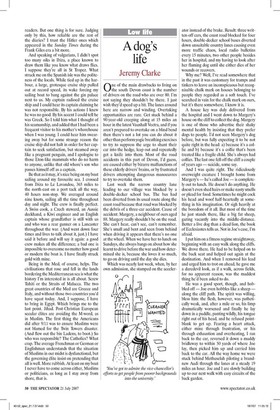A dog's life
Jeremy Clarke One of the main drawbacks to living on the south Devon coast is the number of drivers on the road who are over 80. I'm not saying they shouldn't be there. I just wish they'd speed up a bit. The lanes around here are narrow and winding. Overtaking opportunities are rare. Get stuck behind a 90-year-old creeping along at 15 miles an hour in the latest Vauxhall Vectra, and if you aren't prepared to overtake on a blind bend then there's not a lot you can do about it other than perform yogic breathing exercises to try to suppress the urge to shunt their car into the hedge, leap out and repeatedly get a knife into them. Most of the road accidents in this part of Devon, I'd guess, are caused either by bizarre malfunctions of these elderly drivers' brains, or by frustrated drivers attempting dangerous manoeuvres to try to overtake them.
Last week the narrow country lane leading to our village was blocked by a double-decker school bus. The bus had been diverted from its usual route along the coast road because that road was blocked by the debris of a three-car accident. Cause of accident: Margery, a neighbour of ours aged 88. Margery really shouldn't be on the road. She can't hear, can't see, can't remember. She's small and bent and seen from behind when driving it appears that there's no one at the wheel. When we have her to lunch on Sundays, she always bangs on about how she learnt to drive before the war and how determined she is, because she loves it so much, to go on driving until the day she dies.
Which was nearly last week, when, by her own admission, she stamped on the accelerator instead of the brake. Result: three written-off cars, the coast road blocked for four hours, double-decker school buses diverted down unsuitable country lanes causing even more traffic chaos, local radio bulletins every 15 minutes, two other people besides her in hospital, and my having to look after her flaming dog until she either dies of her wounds or recovers.
Why me? Well, I've read somewhere that in the past it was customary for tramps and tinkers to leave an inconspicuous but recognisable chalk mark on houses belonging to people they regarded as a soft touch. I've searched in vain for the chalk mark on ours, but it's there somewhere, I know it is.
A house key was duly delivered from the hospital and I went down to Margery's house on the cliff to collect the dog. Margery is one of those who advertise their shaky mental health by insisting that they prefer dogs to people. I'd not seen Margery's dog before, but was fully expecting it to be not quite right in the head: a) because it's a collie and b) because it's a collie that's been treated like a fragile child. She's always had collies. The last one fell off the cliff a couple of years ago — suicide, some say.
And I was quite right. The ridiculously overweight creature I brought home from Margery's — he's called Joe — is completely out to lunch. He doesn't do anything. He doesn't even shed hairs or make nasty smells or plead for food. Sometimes he might cock his head and woof half-heartedly at something in his imagination. Or sigh heavily at the boredom of it all. But most of the time he just stands there, like a big fat sheep, gazing vacantly into the middle-distance. Better a live dog than a dead lion, the book of Ecclesiastes tells us. Not in Joe's case, I'm afraid.
I put him on a fitness regime straightaway, beginning with an easy walk along the cliffs. We drove there. He had to be helped on to the back seat and helped out again at the destination. And when I removed his lead and urged him to trot on ahead, he gave me a daredevil look, as if a walk, across fields, for no apparent reason, was the maddest thing he'd been asked to do.
He was a good sport, though, and hobbled off — Joe even hobbles like a sheep — along the cliff path. The spirit was willing, bless him the flesh, however, was pathetically weak, and, after a mile or so, his limp dramatically worsened and finally he lay down in a puddle, panting wildly, his tongue right out of his head, and he refused pointblank to get up. Fearing a heart attack, either mine through frustration, or his through exhaustion and overheating, I ran back to the car, reversed it down a muddy bridleway to within 50 yards of where Joe lay, then picked him up and carried him back to the car. All the way home we were stuck behind Methuselah piloting a brandnew Audi through the lanes at a steady 19 miles an hour. Joe and I are slowly building up to our next walk with easy circuits of the back garden.












































 Previous page
Previous page